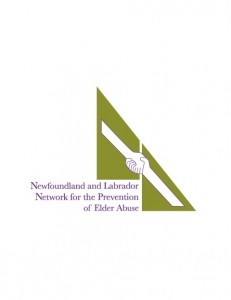- Details
- Published: 25 January 2015
 Interview with Elizabeth Siegel, NLNPEA Provincial Coordinator
Interview with Elizabeth Siegel, NLNPEA Provincial Coordinator
CNPEA: Tell us about the Newfoundland and Labrador Network for the Prevention of Elder Abuse.
Elizabeth: Like any other elder abuse network, our mission is to support stakeholders in preventing elder abuse. One of the main things we do is connect members with resources and information. This includes publishing a quarterly newsletter that shares information on the work of our members and upcoming events through a membership list serve.
We host monthly public information sessions about elder abuse that feature guest speakers from broad backgrounds. We take a really wide-ranging and inclusive approach to elder abuse topics. Sometimes the presenters will speak to directly related elder abuse topics such as indicators of abuse. Other times the presentations will be on more nuanced issues, such as over medication as an abuse tactic.
We are located in the capital, St. John, and host most of our information sessions in the city. Any stakeholder can join our meetings via webinar or teleconference. This gives the opportunity for everybody across the province to participate.
CNPEA: What strategies does your network use to engage stakeholders?
Elizabeth: We try to do a cross section of activities because what would interest a senior can be very different from what would appeal to a service provider. One way we do this is by rotating our monthly meetings to appeal to various audiences.
We also deliberately partner with a wide range of organizational members, from business, Aboriginal organizations, and government, to community centres. Before we go into a community we make sure we have partnerships in place. This can be extremely helpful in engaging community, and even the small things like booking a room. Organizational members are really invaluable.
CNPEA: Tell us about some of your key partners.
Elizabeth: As we are an initiative of the Seniors Resource Centre of Newfoundland and Labrador, we are very connected with their other programming, such as their peer support volunteer program, which provides volunteers with training to do public awareness education and to be the go-to person in the community if seniors need help. It’s a neat way to engage communities and seniors we otherwise would not geographically be able to reach.
We have arranged training opportunities such as Neighbourhood, Friends and Families, which was really well received.
CNPEA: What are some of the key challenges you come across?
Elizabeth: Although public awareness of elder abuse has really grown in the last decade, people are not personalizing it and bringing it home. For example, in our work people often say “oh there is no elder abuse in my community.” But when we start doing a presentation and give examples of what abuse can look like—such as a family member opening and controlling a seniors mail—we see seniors start to nod their heads. I think people focus on physical abuse and may need more help identifying the other types of abuse and neglect that seniors may be experiencing.
CNPEA: What advice would you give to other provinces or territories looking to form or strengthen their own network?
Elizabeth: Cast your membership net wide! Our membership has seniors, private business, care homes and so on. In being very diverse you access a lot of expertise. For instance, we have a number of bankers on our membership list who bring an expertise around financial abuse that has been tremendously helpful. So be creative in who you ask to join your Network.
We started as a committee back in the early 90’s. We become a full fledged Network in the late 2000’s upon receiving New Horizons for Seniors funding. The reason we decided to grow into a Network was that eventually there were so many members that we couldn’t even fit around a table!
For more information check out their website.

















